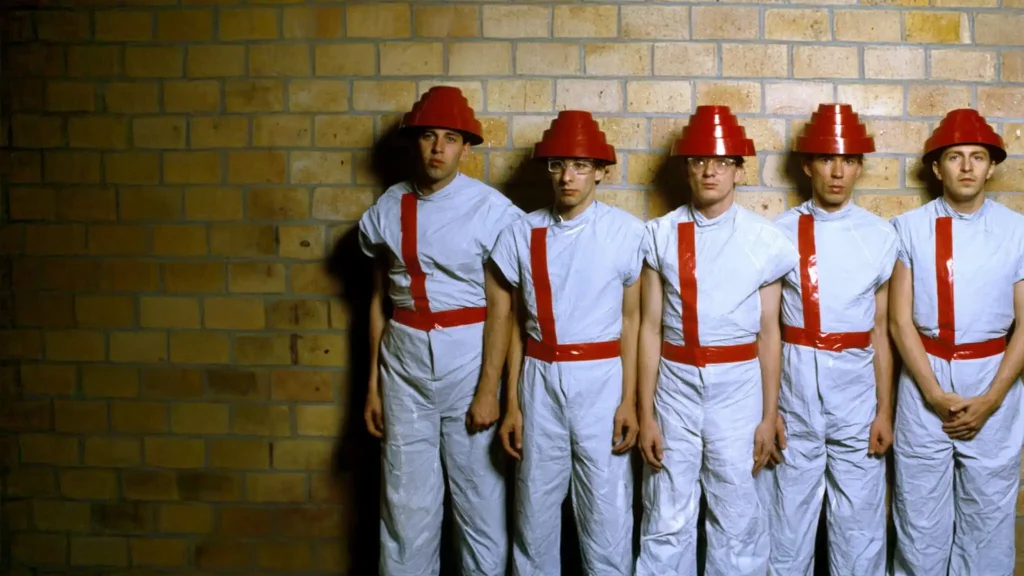
I wasn’t remotely familiar with the new wave band Devo before sitting down to watch Chris Smith’s Netflix documentary about the Akron, Ohio collective’s ‘80s and ‘90s heyday. In a way, I’m glad of that. This is a band – experimental, nonconformist, eccentric, but also undeniably compelling – that was destined never to have sustained mainstream success. The studio system simply wouldn’t allow it, not when their music was a lot of thinly-veiled allegory for impending societal collapse (“Devo” is short for devolution). The sneaky story of how they rose to prominence, then, benefits from the viewer knowing nothing, seeing how their original artistic ideas germinated from deliberately contentious avant-garde nonsense to a recognisable, deeply unique post-punk sound, and how the radically shifting music industry landscape terraformed to shut them out.
It doesn’t matter whether or not you like Devo. You hear some snippets of their more well-known hits in the film, including 1980’s “Whip It”, which seems to be the most well-known, but the music itself matters less than its subversive intentions. Devo were formed from the very beginning around the concept of devolution, the idea that human society was not guaranteed to progress but would ultimately, through its own hubris, destroy itself. Everywhere that bandmates Mark Mothersbaugh and Gerald Casale looked, they seemed to see evidence of this, from the 1970 shooting of four Kent State classmates by Ohio National Guardsmen, to the catastrophe of the Vietnam War.
Mothersbaugh and Casale are both interviewed separately but extensively, and this, I think, is the most effective component of Smith’s film, which doesn’t have – deliberately, I would argue – the innate weirdness that characterised Devo as a group. Mothersbaugh and Casale don’t come across like try-hard eccentrics, but reasonable, self-aware individuals who can coolly articulate their precise intentions through every step of the journey. Even if the journey is a familiar one, presented in a recognisable way from Devo’s complete obscurity to their actively off-putting experimentalism, then to their surprising endorsement and unexpected success, the group’s underlying sense of eccentricity is deeply felt. Mothersbaugh and Casale’s nonchalant explanations of why they were doing the things they were doing give the whole shtick a retroactive intentionality that probably wouldn’t have been sensed by record labels and the general public at the time.

This, in turn, makes Mothersbaugh and Casale, along with drummer Alan Myers, guitarist Bob Mothersbaugh, and guitarist/keyboardist Bob Casale – the latter two being the younger brothers of Mark and Gerald – seem more forward-thinking and ahead of their time. Crucial to the Devo story is understanding that Devo knew what they were doing, not just musically, but in their entire public-facing identity. Their songs were politically and socially relevant, but engineered in a way that suggested they might not be. They openly made fun of trends and prevailing mainstream mentalities. In television and print interviews, they came out with complete nonsense to bamboozle journalists. It was all deliberate.
The great irony is that Devo were successful, and in many ways that success wasn’t as a counter-cultural band with something important to say but as a less contentious one whose music people had simply misunderstood. You can see that this causes Devo obvious consternation; their most memorable hits were supposed to have a point, and even though people generally missed it, they liked the tunes anyway. Should they take the win? Change their style to be more easily understood, but risk diluting the innate eccentricity of their art? These are the most compelling questions Smith raises, and you can see why he felt no need to muddy the waters by being too formally daring.
And Devo were right! In so many of their critiques about modern American life, about the music industry, about thoughtless mainstream homogeneity, they were strikingly prophetic. And in a roundabout way, they predicted their own downfall, because they predicted, accurately, that their devotion to their art and ideas at the expense of what was popular and pre-approved for consumption would lead to them being blackballed in favour of other artists who made more money and caused less problems doing it. Compelling stretches of this movie find Mothersbaugh and Casale butting heads with executives who wouldn’t let them, say, feature an animated French fry passing through the hole of a donut because of its lurid connotations, at the same time being totally happy for Billy Joel’s videos to include basically anything he wanted. Billy Joel was, after all, Billy Joel. And Devo were, for better and worse, just Devo.
As a curious non-fan, though, I’m glad Devo had their time in the spotlight, and glad that now they get a chance to explain how much cleverer they were than they ever got credit for at the time.


